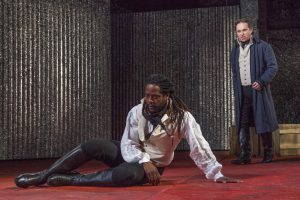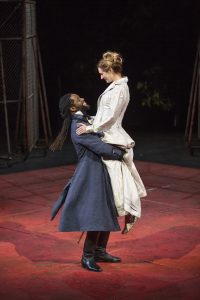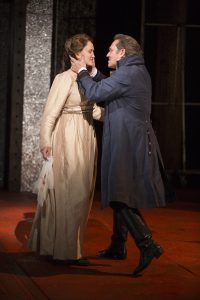Iago Scores Early and Often in Old Globe OTHELLO
Everybody knows that Iago will win. That he will goad Othello into strangling the innocent Desdemona in a rage of jealous hysteria and then kill himself when her innocence is revealed.
That’s the story, a tragedy that could be contained within a tight news story all on Page One. But Shakespeare’s tragedy just uses the tale as a frame for a deep and anguished exploration of the human psyche. And that takes time. A couple of hours, at least.
In the Old Globe production of Othello on the Lowell Davies Festival Theatre stage, it’s obvious almost from the opening lines that this Iago is going to crunch these two dupes. Too obvious. There’s no contest.
So why, then, bother with the play? Why not just jump to the death scene and enjoy the language?
Because, even though the result is inevitable, it’s how the thing plays out that’s fascinating.
From Iago’s perspective, everybody around him is a dupe. His follower Roderigo is such a fool that he pays Iago good money for extremely bad advice. At his command, Iago’s wife steals clues from her friend. His fellow officer Cassio, just promoted over him, can be controlled simply by getting him nasty drunk.
Othello, the barbaric outsider who has risen to power and acclaim in Venice by his prowess in battle and nobility in leadership, and the virginal Desdemona, who defies her father and accepts Othello as husband, are just as vulnerable, in Iago’s contemptuous opinion, because of their joy in each other and their lofty idealism.
It isn’t easy to poison Othello’s mighty mind and spirit. There are times when he nearly regains his senses, when Iago must scramble to find more fuel for the flame, when Desdemona’s sheer purity almost derails the train. Even in the last tortured moments of her life, there might be hope…
Except not really. The play’s conclusion is set in granite, part of our culture. But the insights to be gained, the pity to be tasted, the cautions to be remembered and the ironies to be contemplated are the reason to take this journey yet again.
Director Barry Edelstein is to be congratulated for a well cast, tightly knit and handsomely presented show. The original music by Curtis Moore, a constant presence in the hands of Ryan Nestor and Jonathan Hepfer on an array of percussion and stringed instruments, gives the production a unified vitality almost flawless. Wilson Chin’s set, based on foil-covered flats and corrugated panels, is ultimately acceptable as are the austere but correct black and white costumes by Katherine Roth.
Stephen Strawbridge, dumping banks of spotlights and experimenting with powerful footlights, suggests some new options in lighting design for this stage while providing handsomely for this show.
Yet there are arid stretches in this Othello, deflating the flow and frustrating the ride.
A warrior as formidable as Othello would need more proof. Even if the horror that rips at his entrails is a product of his own ailing spirit, he should fight back against the messenger. And Iago probably should not be quite this endlessly deft and lucky. He seems almost able to steer without touching the controls. Thus, audience attention lags.
Responsibility is the director’s. His actors are comfortable in their roles and vivid in their performances. The assumption is, they’re following orders.
This Iago, played with chilling efficiency by Richard Thomas, wastes no time on motivation. He was passed over for promotion. He’s heard that his wife may have messed around with Othello. Whatever. His real reason for breeding chaos, Thomas demonstrates, is because he can.
Blair Underwood plays Othello with a full and lusty swagger, suiting his natural majesty to the political realities of Christian court in Renaissance Venice. As he begins to waver, though, his dreadlocks fall loose, he starts to gesture in jungle mime and his words take on a Reggae rhythm. I find nothing wrong with this, jarring and inconsistent as it may be. Shakespeare, who knew as little about “moors” as he did Jews, simply needed a hero who is the eternal outsider. The details aren’t important and the choices of Underwood and his director work just fine as he achieves notable impact in the amazing final scene.
There’s little to say about Kristen Connolly as Desdemona except “well-done.” She’s a lovely, poised actress with a strong, supple voice and an artless, direct manner, which suits the role. Noah Bean as Cassio uses an appealing boyish charm, which doesn’t always click with his more seamy aspects. As Roderigo, Jonny Orsini leans too much toward Andrew Aguecheek (Twelfth Night).
Angela Reed, playing Iago’s wife Emilia, has been betrayed by the staging. Though her performance is well shaped and appropriate, the big problem of her part is unaddressed.
One of the keys to the plot is a special handkerchief given to Desdemona by Othello during their courting days. Iago demands that Emilia, who serves as Desdemona’s companion, steal the cloth for him. She discovers it left behind and dutifully delivers. Then later, when the handkerchief is damning evidence of Desdemona’s infidelity with Cassio, Emilia stays silent.
Of course, if she spoke up, there would be no play thereafter. But still… Is she being dutiful to her husband? Fearing for her job? Callously dismissing quarrels among her betters? Whatever, her failure to speak up in time results in tragedy, for herself, too.
One way to blunt this problem is to keep Emilia out of earshot during the handkerchief rants. She doesn’t need to be there and it’s just a stage direction to get her away. But on this occasion, Angela Reed must stand and listen.
A pity, because later, Reed’s pounding fury in the finale seems more than enough but far too late. It’s never a good idea to add or substantially change Shakespeare’s stuff but part of the director’s job is to provide the emphasis that clarifies and engages the audience, whatever the era.
[box] Continues nightly at 8 except Mondays and July 4 through July 27, 2014.[/box]

Welton Jones has been following entertainment and the arts around for years, writing about them. Thirty-five of those years were spent at the UNION-TRIBUNE, the last decade was with SANDIEGO.COM.





